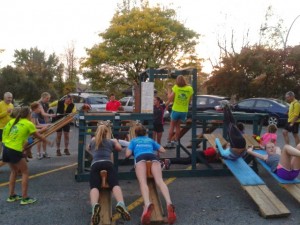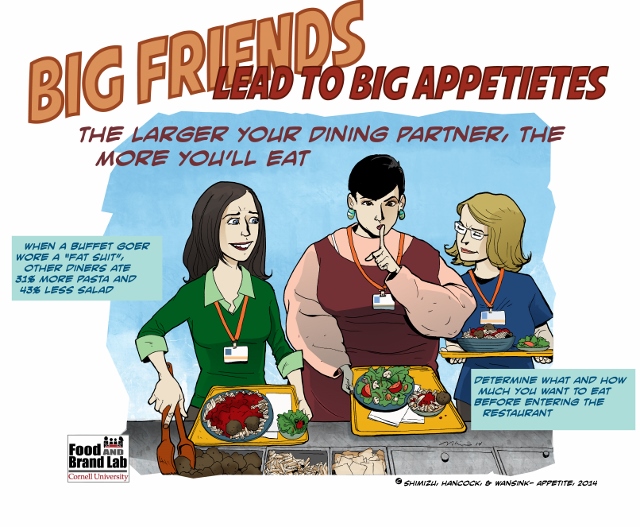This week, read about how your dining partner can influence what you eat, more research on benefits of strength training, and nutrition, health, and fitness news.
The Larger Your Dining Partner, the More You’ll Eat
Here is another fascinating study from Brian Wansink of Cornell’s Food & Brand Lab. The study found that people are more likely to eat unhealthy foods if someone nearby is overweight. The study enlisted an actress who appeared in various dining conditions, including wearing a fat suit (that added 50 pounds) in one scenario. Researchers found that regardless of what the actress ate, study participants ate a larger amount of unhealthy food when the actress was wearing the fat suit than when she was not. Other research has shown that people around you can influence your commitment to your health goals. Practicing tuning into your own feelings of hunger to help you stick to you eat wisely and ignore influences around you. (Appetite, December 2014, 263-268).
 Dave’s Strength Machine
Dave’s Strength Machine
Here is one of the reasons I have so much fun coaching! Dedicated athletes, innovative ideas, and incredible people, like Dave Mallory. His strength machine is pretty special . . . a movable strength fortress equipped with rollerboards, pulleys, and suspended hanging grip handles for pullups, pushups, and dips (just in case the regular form of these exercises isn’t hard enough . . .)
More links of interest this week:
- Remember to strength train! Lifting weights can improve long-term memory, according to a recent study, possibly because of increases in the neurotransmitter norepinephrine. (Acta Psychologica, November 2014).
- Exercise as ADHD Medication? Exercise inked to improved mental focus, memory, & academic performance (The Atlantic)
- Is coconut oil good for you? Alice Lichtenstein answers; similar to my review here.
- Who doesn’t like free food? The Psychology Behind Free Food Samples (The Atlantic)
- Is It Good or Bad to Take a Nap? Sleep researcher/napping expert Sara Mednick weighs in. (Time Health)
- Why You Should Eat Like An Elite. Here are some good nutrition habits to maximize your nutrition and performance. (Matt Fitzgerald, Competitor Magazine).
- Exercise and Depression. Activity can be as effective as medication, and researchers are starting to understand underlying mechanisms. (New York Times Well).
- Beautiful science art – have a look! 30 Science Artists in 30 Days. (Symbiartic Scientific American Blog).
- I”m not the only one to think of recipes while running! The Workout: A Star Chef Finds Inspiration (New York Times)
- Diet and cancer. Leading nutritional epidemiologist Walter Willett believes research will show that a healthy diet can reduce cancer risk. Here’s why. (Cancer Today, Fall 2014).
- If it matters, measure it! Self-monitoring your diet is one of the best strategies to make behavior changes and control your weight. There are many great apps out these to help you. Here are some good tips on what to look for (American Institute for Cancer Research).
- You start losing muscle when you’re 40, but strength training and diet can help. New study and review shows 1 in 3 adults over 50 suffer progressive muscle loss (sarcopenia). Summary. (Age and Ageing, October 2014).
- Racing in hot conditions? Hypothermic conditioning for exercise performance (video). Heat training expert explains how to use heat acclimation techniques to improve performance (Paul Laursen, Sport Performance Research Institute New Zealand (SPRINZ), AUT University.)
- For those with problem hamstrings: Revolutionary hamstring tester (measures eccentric strength) helps reduce hamstring strains by measuring strength during nordic hamstring curl. Adds to a growing body of research showing that eccentric strength is critical for preventing and rehabilitating problem hamstrings. (Medicine & Science in Sports & Exercise, 2014).
- Tapering for a race? What’s going on at the molecular level when runners taper. (PlosOne Sept 30, 2014).
- Tim Noakes, proposing research similar to Canadian nutrition experiments on Aboriginals (Africa is a Country Blog)
- Sense of Smell Predicts Longevity. Reflects underlying mechanism related to aging? (PlosOne October 2014).
